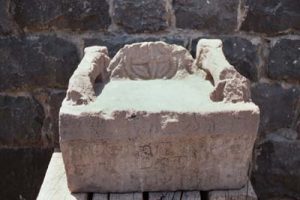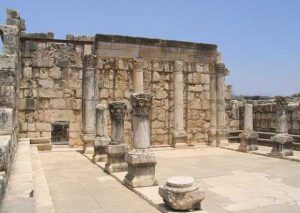by Pastor Ed Visser
On the Sabbath day he went into the synagogue, as was his custom. And he stood up to read. The scroll of Isaiah the prophet was handed to him. Unrolling it, he found the place where it is written, “The Spirit of the Lord is on me …” Then he rolled up the scroll, gave it back to the attendant and sat down. The eyes of everyone in the synagogue were fastened on him, and he began by saying to them,
“Today this Scripture is fulfilled in your hearing.”
Luke 4:16-21
 Many of the places we visited in Israel boasted the ruins of ancient synagogues. As we read in this passage, Jesus was in the habit of attending synagogues in Galilee, often being asked to read the
Many of the places we visited in Israel boasted the ruins of ancient synagogues. As we read in this passage, Jesus was in the habit of attending synagogues in Galilee, often being asked to read the
Bible and preach. In those days, that entailed reading a prescribed Torah passage & a self-chosen portion from the prophets, all done standing. Then the reader would sit in Moses’ Seat and share what the Scripture meant to him (the sermon).
One Sabbath Jesus was invited to do so in his hometown synagogue in Nazareth. We don’t know what the Torah portion was for the day, but Jesus chose to read Isaiah 61:1-2, changing the reading in a couple of important ways: 1) he dropped the last half of Isaiah 61:2, “the day of vengeance of our God”; and 2) he added a phrase from Isaiah 58:6, “to release the oppressed.” While this may seem like Scriptural manipulation to us, it was a a very acceptable form of biblical interpretation for the Jews, in which they linked verses that contained similar words or phrases to make their point. So what was Jesus’ point?
 The Isaiah 61 passage had been linked with the biblical theme of Jubilee, freedom from slavery and return to the land (when in exile). But it also was seen as the promise of the coming messiah, who would bring not only Jubilee for Israel, but God’s judgment on their oppressors. Thus, many (including John the Baptizer) expected messiah to bring freedom by coming with a sword.
The Isaiah 61 passage had been linked with the biblical theme of Jubilee, freedom from slavery and return to the land (when in exile). But it also was seen as the promise of the coming messiah, who would bring not only Jubilee for Israel, but God’s judgment on their oppressors. Thus, many (including John the Baptizer) expected messiah to bring freedom by coming with a sword.
Jesus’ changes in the reading were his way of challenging faulty expectations. Messiah was not coming with “vengeance” (at least not yet), and Jubilee was to be a mutual effort of Messiah and the people of God. Messiah brought freedom from sin. But Isaiah 58 is a message calling Israel to enact Jubilee themselves by taking care of the poor & oppressed among them, not waiting for Messiah to do it! Jesus then sat on the Seat of Moses and told them that he was Messiah. But, as we gather from the Wheat & Weeds parable, the final judgment would come later, when he returned.
Until then, they, and we today, live in the Kingdom of God and are called to enact Jubilee on earth. How are we doing?

